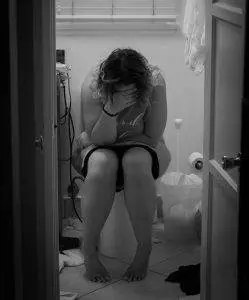By Qineng Tan, L.Ac., Ph.D. & Xiaomei Cai, L.Ac., Ph.D.

Why do I feel like I have to pee all the time? A urinary tract infection, usually referred to as UTI, is a bacterial infection that affects the bladder and/or other parts of the urinary system, causing urinary urgency, often accompanied by a burning pain when you go to the bathroom. Acupuncture and TCM is a good way to get to the root causes of frequent urination, including recurrent UTIs.
Urinary frequency, or an unusual urgency to urinate, can be caused by several different health conditions. A common cause of bladder pain, pressure on the bladder, or a burning sensation when peeing is a bacterial infection in the urinary tract, or UTI. But there can be many other reasons for constantly feeling like you have to pee, including diabetes, interstitial cystitis (IC), pregnancy, prostate problems, ovarian cysts, and more.
Over half of all adult women have experienced a UTI (also called cystitis) at some point in their lives. Many women get UTIs frequently, making them the most common type of non-hospital-related infection in the U.S. Up to 6% of all doctor visits are related to UTIs. A UTI can occur when bacteria, usually E. coli, gets into the urethra and travels up into the bladder, or further into the urinary tract. This can happen because of hygiene habits, after sex or exercising, or the use of contraceptives or period products. It can also happen when urine sits in the bladder for too long, or because a person has a weakened immune system.
While UTI treatment at home remedies such as drinking cranberry juice are popular, most women recognize that once they get that constant urge to pee, they have no choice but to rush to the doctor for antibiotics. Typical UTI medical treatment almost always involves confirming the infection by lab analysis, and a prescribed course of antibiotics, along with analgesic medicine (such as Pyridium) to help the UTI pain in bladder. Unfortunately, many women keep getting UTIs. Infections that are antibiotic resistant are increasingly common, and antibiotics do not get to the root of the problem.
Interstitial cystitis (IC), or painful bladder syndrome, is a condition that causes a constant sensation of having to pee, or bladder pressure, even when there is no infection present. Recurrent UTI and IC are a significant source of anxiety and depression for women, as they can cause almost constant pain and an inability to leave the house due to the constant urge to urinate.
UTI in men is not as common as UTI in women. The more common cause of frequent urination in men is benign prostatic hyperplasia (BPH), in which an enlarged prostate presses on the urinary organs, blocking the flow of urine, and causing backup that can lead to bacterial urinary tract infection men.
Sometimes what feels like a UTI might be something else. Growths in the pelvic area, such as ovarian cysts, uterine fibroids, or tumors can cause pressure in the bladder, bladder pain, or urinary frequency at night. Even when there is no infection, there may urinary symptoms such as:
- Strong urge to pee frequently (more than 8 times per day)
- Difficulty urinating
- Urine is different color than usual
- Pain during peeing, or burning sensation when peeing
- Nocturia, frequent urination at night
The conventional medicine answer to UTI is antibiotic treatment, but this is not the only answer for everyone. TCM methods of acupuncture and herbs can help with improving the function of bladder and kidney systems, reducing symptoms from recurrent UTIs, as well as helping to address the deeper problems that cause inflammation and pressure in the bladder.
Top 10 Urinary Frequency Causes
There are many possible causes of frequent urination.
- UTI (urinary tract infection, also called cystitis, or bladder infection)
- Kidney infection – when bacteria move further up into the urinary tract, the kidneys can become infected. Sometimes people with nerve damage in the spine cannot feel UTI symptoms (neurogenic bladder), so the infection becomes more widespread.
- Bladder stones – when the bladder does not empty completely, urine can crystallize and form hard stones, causing pain during urination.
- Interstitial cystitis (painful bladder syndrome) – a syndrome of urinary pain symptoms, the exact cause of which is unknown. Inflammation of the bladder lining may be due to trauma (from surgery or delivery/birth), overdistension, or dysfunction of the pelvic floor muscles.
- Prostatitis – inflammation of the prostate accompanied by irritation of the nerves in the area; not necessarily an infection, although a bacterial infection of the prostate can occur.
- Urinary incontinence – leakage of urine, occurs when the urethral sphincter that controls the flow and stoppage of urine is weak. More common in women and older people.
- Vaginitis – inflammation of the vagina, usually due to infection. Candida, or yeast infection, is one type of vaginitis.
- Diabetes – can cause a variety of urinary problems, due to the body producing more urine to process blood sugar, and nerve damage that leads to urinary retention and incontinence. Constant thirst is also a sign of diabetic urinary symptoms.
- Side effects of cancer treatment in pelvic area – cancer treatments that affect the pelvis, including radiation, chemotherapy, immunotherapy, and surgeries to remove pelvic organs, can all cause irritation or damage to the bladder.
- Overactive bladder (OAB) – a group of symptoms, including frequent urination, leakage, nocturia (getting up to pee at night), and primarily, a strong urge to urinate often. Considered to be caused by inappropriate signalling of the nerves that communicate between the brain and the urinary tract organs.

Causes of frequent urination vary somewhat according to biological sex. Frequent urination in men is often caused by prostate problems, while frequent urination in women may be due to pregnancy or other womens’ health conditions related to the ovaries or uterus.
Pressure on the bladder because of pregnancy, or from other organs, can also cause urinary frequency and discomfort. This can happen due to an anterior prolapse, when the pelvic floor is weakened, and the uterus, intestine, or bladder drop from their normal position. When a woman is pregnant, the heavy uterus often causes more frequent urination, or, in some cases, urinary retention. Damage or trauma to the pelvic floor can occur during delivery, so many women experience weak pelvic floor muscles, prolapsed uterus or bladder, and ongoing urinary urgency after they have had a baby.
In men, an enlarged prostate or prostatitis (infection and inflammation of the prostate) can put pressure on the bladder and other parts of the urinary system.
A frequent need to pee can also be caused by drinking too much coffee or alcohol, or taking diuretics.
Can Acupuncture Help Frequent Urination?
In Chinese Medicine, urinary problems come under the classification of “Lin Syndromes.” Lin disorders generally involve painful, “dribbling” urination and are caused by disharmonies in the Bladder and Kidneys, as well as involving other major organs like the Heart, Liver, and Spleen. Dampness and Heat are the primary pathogenic factors, so we use acupuncture treatment and herbal formulations to clear heat and dampness from the body.
Top 5 TCM differentiations of UTI:
- Damp Heat – characterized by frequent urination, burning sensation when peeing, painful pressure in bladder, dark urine or cloudy urine that smells unusual, feelings of nausea, bitter taste in mouth
- Heart Fire – frequency and urgency, thirst, hot, red face and chest, trouble sleeping/insomnia, irritability, anxiety, heart palpitations
- Liver Fire – excess heat causes painful burning during urination, headaches, ringing in ears/tinnitus, constipation, feelings of anger and frustration, redness in eyes and face.
- Fatigue Lin – covers urinary disorders that involve incomplete emptying of the bladder, due to prostate enlargement or prolapsed pelvic organs.
- Stone Lin – obstructions of the urinary system due to buildup of minerals that create stones in the bladder, kidney stones, etc.
Patients who have problems with recurring UTIs may be resistant to the antibiotics they’ve been given. TCM herbs can be used as an additional or alternative remedy from antibiotics and help to strengthen the immune system overall. One review of studies involving the use of Chinese herbal medicine (CHM) for UTIs concluded that the herbs, whether used alone or in conjunction with antibiotics, worked better than antibiotics alone.
One study showed that women who were prone to getting UTIs who were treated with acupuncture as preventative care only got a UTI one-third as often as women who didn’t receive acupuncture. Acupuncture has also been shown to be highly effective for bladder pain due to interstitial cystitis. Studies have also shown that TCM treatment can relieve the blockage of urine caused by an enlarged prostate (BPH).
Top 5 Tips for Preventing UTI

What a relief! Now that you’ve gotten over that urinary tract infection, it’s important to take steps to prevent getting another UTI. Here are some natural ways to prevent UTIs:
- Drink more water – This may seem counterintuitive, as you don’t want to have to pee even more. But you do want to be constantly flushing bacteria out of the urinary tract. Avoid drinks like coffee and soda, which can be irritating to the bladder.
- Go when you feel you need to – Some therapies for overactive bladder or IC involve training yourself to hold urine, but for most people, this is not a good idea. Retaining urine for too long contributes to bacterial growth and causes overdistension of the bladder.
- Hygiene – be sure to wipe from front to back when you go to the bathroom. Change clothes and underwear often, especially after sweating. During your menstrual period, change your pad and tampon frequently.
- After sex – always go to the bathroom and urinate before falling asleep.
- Avoid chemical products – Avoid using deodorants, douches, or scented wipes around the genital area. Consider whether contraceptive products like spermicides might also be part of the problem.
Acupuncture Near Me for UTI
While it is rare for a UTI to become so serious that you have a fever or become nauseated, urinary problems should be taken seriously before they become worse. If your UTIs keep coming back, or you constantly feel like you have to pee, it may be a sign that there is something deeper going on. As people age, urge incontinence, prolapsed organs due to weak pelvic floor muscles, and nerve damage can lead to more serious bladder problems. TCM provides a holistic way to treat urinary tract issues, as well as other, possibly hidden conditions in the pelvic region. Urinary urgency may be a signal of something else, so don’t ignore it. Consult with your acupuncturist to find urinary frequency relief.
*This article is for education from the perspective of Traditional Chinese Medicine only. The education provided by this article is not approved by FDA to diagnose, prevent, treat and cure human diseases. It should not stop you from consulting with your physician for your medical conditions. Traditional Chinese Medicine is based on Qi, which is an invisible force that usually cannot be observed by modern science. Because science focuses on testing ideas about the natural world with evidence obtained through observation, these aspects of acupuncture can’t be studied by science. Therefore acupuncture and Chinese herbs are often not supported by double-blind, randomized trials, and they are considered alternative medicine therapies in the United States.
